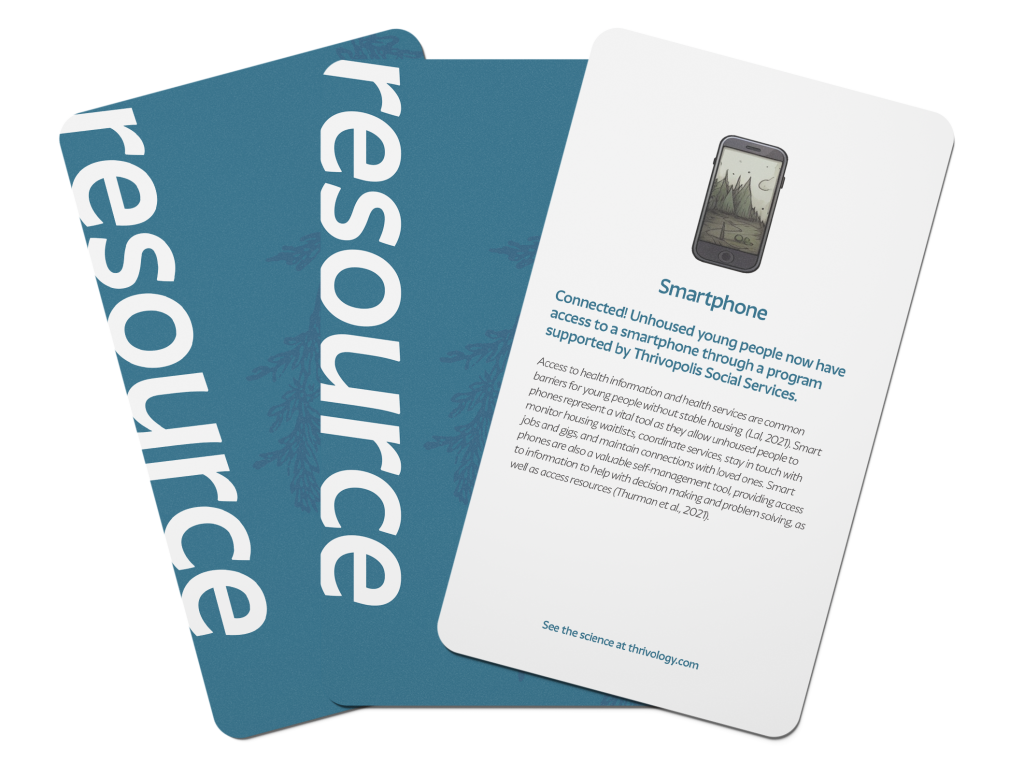Thrivopolis

A game and discussion where players navigate a social safety net in the not-so-distant future
In the wake of the Great Unraveling in the not-so-distant future, a brave few set out to construct a utopian refuge high in the treetops. Born was Thrivopolis, a verdant, gleaming city in the lush embrace of the trees – a true testament to the enduing spirit of humanity.
As a dedicated youth-supporting professional, you are integral to this grand experiment. Your mission is to navigate a social safety net suspended in the canopy, gathering valuable resources to better the lives of those that you support.
Along the way, you’ll soon discover the eerie echoes of the world that came before.


In Thrivopolis, players navigate the city’s verdant pathways in search of valuable resources to help young people heal and thrive.
But time is of the essence and players must act fast! Event cards reveal changes in the social and political environment, shifting the Thrivopolis safety net and the very ground beneath!
In your not-so-distant future:
Ready-to-play and print-at-home Thrivopolis!
This fall
It’s playtime!
Youth-supporting professionals may join the fun at Thrivopolis events nationwide. Look for us at:
- Teen Pregnancy Prevention Grantee Conference, July 15–17, 2024 in Baltimore, Maryland
- “Rise, Reimagine, and Reinvent,” the Healthy Teen Network Annual National Conference, Novmeber 18–20, 2024, in Phoenix, Arizona

Expert guidance for an unforgettable Thrivopolis experience:
At-home STI testing
Centers for Disease Control (2021, July 22). Sexually Transmitted Infections Treatment Guidelines, 2021. https://www.cdc.gov/std/treatment-guidelines/adolescents.htm
Centers for Disease Control. (2024, April 9). Getting Tested for STIs. https://www.cdc.gov/sti/testing/index.html#:~:text=All%20sexually%20active%20people%20ages,gonorrhea%20and%20chlamydia%20every%20year.
Shih, S., Graseck, A., Secura, G., Peipert, J. (2011) Screening for sexually transmitted infections at home or in the clinic? Current Opinion in Infectious Disease, 24(1):78-84. doi: 10.1097/QCO.0b013e32834204a8.
Melendez, J.H., Hamill, M.M., Armington, G.S., Gaydos, C.A., Manabe, Y.C. (2021). Home-Based Testing for Sexually Transmitted Infections: Leveraging Online Resources During the COVID-19 Pandemic. Sexually Transmitted Diseases., 48(1), e8-e10. doi: 10.1097/OLQ.0000000000001309.
Reitmeijer, C. (2019). Improving care for sexually transmitted infections. Journal of the International AIDS Society, 22(6), e25349. doi: 10.1002/jia2.25349
Checking Account
Money Matters: Make it Count. https://www.bgca.org/programs/education/money-matters/ – Teaches teens how to set goals, budget, save and invest. In addition to staff-led financial literacy sessions, young people practice their financial decision-making skills through fun, engaging digital tools and games. Teens who complete Money Matters show improved financial management skills, including saving money and sticking to a budget. Program is supported by Charles Schwab Foundation.
Money Smart (2024). Money Smart for Young People. Federal Deposit Insurance Corporation. https://www.fdic.gov/resources/consumers/money-smart/teach-money-smart/money-smart-for-young-people/index.html – FDIC Money Smart for Young People features four free age-appropriate curricula that promote financial understanding and are specifically designed for pre-kindergarten through 12th grade educators.
Condoms
Office of Disease Prevention and Health Promotion. (n.d.). Increase the proportion of adolescent males who used a condom the last time they had sex. Healthy People 2030. U.S. Department of Health and Human Services. https://health.gov/healthypeople/objectives-and-data/browse-objectives/family-planning/increase-proportion-adolescent-males-who-used-condom-last-time-they-had-sex-fp-06
Tibbits, M., Ndashe, T.P., King, K., & Siahpush, M. (2018). Promoting Condom Use Through a Youth-Focused Community-Wide Free Condom Distribution Initiative. American Journal of Public Health, 108(11):1506-1508. doi: 10.2105/AJPH.2018.304679.
High School Diploma
Zaff, J., Donlan, A., Gunning, A., Anderson, S., McDermott, E., & Sedaca, M. (2017). Factors that promote high school graduation: A review of the literature. Educ Psychol Rev, 29, 447 – 476. DOI 10.1007/s10648-016-9363-5
Building a Grad Nation: Progress and Challenges in Raising High School Graduation Rates, Annual Update 2019. https://files.eric.ed.gov/fulltext/ED597661.pdf
Office of Disease Prevention and Health Promotion. (n.d.). Increase the proportion of high school students who graduate in 4 years. Healthy People 2030. U.S. Department of Health and Human Services. https://health.gov/healthypeople/objectives-and-data/browse-objectives/adolescents/increase-proportion-high-school-students-who-graduate-4-years-ah-08
HPV Vaccine
Kaul, S., Do, T., Hsu, E., Shmeler, K., Montealegre, J., & Rodriguez (2019). School-based human papillomavirus vaccination program for increasing vaccine uptake in an underserved area in Texas. Papillomavirus Research, 8, 100189, 1 – 8. https://doi.org/10.1016/j.pvr.2019.100189
Centers for Disease Control and Prevention (2021, November 16). Human Papillomavirus (HPV) Vaccination: What Everyone Should Know. https://www.cdc.gov/vaccines/vpd/hpv/public/index.html#:~:text=HPV%20vaccine%20may%20be%20available,vaccine%2C%20ask%20for%20a%20referral
Office of Disease Prevention and Health Promotion. (n.d.). Increase the proportion of adolescents who get recommended doses of the HPV vaccine. Healthy People 2030. U.S. Department of Health and Human Services. https://health.gov/healthypeople/objectives-and-data/browse-objectives/vaccination/increase-proportion-adolescents-who-get-recommended-doses-hpv-vaccine-iid-08
Menstruation Products
UNICEF (n.d.). Menstrual Hygiene: Gender inequality, cultural taboos and poverty can cause menstrual health needs to go unmet. https://www.unicef.org/wash/menstrual-hygiene
UNICEF (2019). Guide to Menstrual Hygiene Materials. https://www.unicef.org/media/91346/file/UNICEF-Guide-menstrual-hygiene-materials-2019.pdf
Naloxone
Chadi, N. & Hadland, S. (2019). Youth Access to Naloxone: The Next Frontier? Journal of Adolescent Health, 65(50), 571-572. doi: 10.1016/j.jadohealth.2019.08.005
Reid, M., Whaley, S., & Allen, S. T. (n.d.) Harm Reduction Vending Machines: What are they and do they work? John Hopkins Bloomberg School of Public Health. https://opioidprinciples.jhsph.edu/harm-reduction-vending-machines-what-are-they-and-do-they-work/
Stop Overdose (2024). Lifesaving Naloxone. Centers for Disease Control and Prevention. https://www.cdc.gov/stop-overdose/caring/naloxone.html
National Institute on Drug Abuse (2022). Naloxone Drug Facts. National Institutes of Health. https://nida.nih.gov/publications/drugfacts/naloxone#:~:text=It%20is%20an%20opioid%20antagonist,because%20of%20an%20opioid%20overdose.
Name Change Assistance
Vance, S. (2018). The Importance of Getting the Name Right for Transgender and Other Gender Expansive Youth. Journal of Adolescent Health, 63(4), 379-380. :https://doi.org/10.1016/j.jadohealth.2018.07.022
Movement Advancement Project (2024). Identity Document Laws and Policies. https://www.lgbtmap.org/equality-maps/identity_documents
Photo ID
Sander, C., Burnett, K., Lam, S., Hassan, M., & Skinner, K. (2020). “You Need an ID to Get an ID”: A scoping review of personal identification as a barrier to and facilitator of the social determinants of health in North America. International Journal of Environmental Research and Public Health, 17(12):4227. doi: 10.3390/ijerph17124227
Pierce, M. (2024). Proof of ID: Building access and personhood in the social service ecosystem through exchange. Journal of Public Policy & Marketing, 43(2), 95-111. https://doi.org/10.1177/074391562311903
Kolb, L. & Pokempner, J. (2017). Proving I Exist: Strategies for Assisting Youth in Obtaining Identification Documents. American Bar Association. https://www.americanbar.org/groups/litigation/resources/newsletters/childrens-rights/strategies-assisting-youth-obtaining-identification-documents/
Smartphone
Lal, S., Halicki-Asakawa, A., & Fauvelle, A. (2021). A Scoping Review on Access and Use of Technology in Youth Experiencing Homelessness: Implications for Healthcare. Frontiers in Digital Health, 3, article 782145. https://doi.org/10.3389/fdgth.2021.782145
Thurman, W., Semwal, M., Moczygemba, L., & Hilbelink, M. (2021). Smartphone Technology to Empower People Experiencing Homelessness: Secondary Analysis. Journal of Medical Internet Research, 23(9), e27787. doi: 10.2196/27787
Economic Stability
Cash for change!
Office of Disease Prevention and Health Promotion. (n.d.). Poverty. Healthy People 2030. U.S. Department of Health and Human Services. https://health.gov/healthypeople/priority-areas/social-determinants-health/literature-summaries/poverty
Chapin Hall. (n.d.) Innovative Direct Cash Transfer pilot program for youth experiencing homelessness to expand to San Francisco. The University of Chicago. https://www.chapinhall.org/project/innovative-direct-cash-transfer-pilot-program-for-youth-experiencing-homelessness-to-expand-to-san-francisco/
Division X Technical Assistance (2023). Providing Direct Financial Assistance to Youth and Young Adults. Child Welfare Capacity Building Collaborative. https://capacity.childwelfare.gov/sites/default/files/media_pdf/Providing%20Direct%20Financial%20Assistance%20to%20Youth%20and%20Young%20Adults_508.pdf
Still searching for the right fit!
Office of Disease Prevention and Health Promotion. (n.d.). Employment. Healthy People 2030. U.S. Department of Health and Human Services. https://health.gov/healthypeople/priority-areas/social-determinants-health/literature-summaries/employment
Kaya, C., Chan, F., Rumrill, P., Hartman, E., Wehman, P., Iwanaga, K., Pai, C.H., & Avellone, L. (2016). Vocational Rehabilitation Services and Competitive Employment for Transition-age Youth with Autism Spectrum Disorders. Journal of Vocational Rehabilitation, 45, 73-83. DOI: 10.3233/JVR-160812
Rast, J. E., Roux, A. M., Shattuck, P.T. (2020). Use of Vocational Rehabilitation Supports for Postsecondary Education Among Transition-Age Youth on the Autism Spectrum. Journal of Autism and Developmental Disorders, 50, 2164-2173. https://doi.org/10.1007/s10803-019-03972-8
Education Quality & Access
Bullying: On the menu
Office of Disease Prevention and Health Promotion. (n.d.). Schools. Healthy People 2030. U.S. Department of Health and Human Services. https://health.gov/healthypeople/objectives-and-data/browse-objectives/schools
Craig, J.T., Gregus, S.J., Elledge, L.C., Pastrana, F.A., Cavell, T.A. (2016). Preliminary investigation of the relationship between lunchroom peer acceptance and peer victimization. Journal of Applied Developmental Psychology, 43, 101-111. https://doi.org/10.1016/j.appdev.2016.01.005
Oh baby, it’s about time!
Office of Disease Prevention and Health Promotion. (n.d.). High School Graduation. Healthy People 2030. U.S. Department of Health and Human Services. https://health.gov/healthypeople/priority-areas/social-determinants-health/literature-summaries/high-school-graduation
National Women’s Law Center (2023). Supporting Pregnant and Parenting Students in Middle Schools and High Schools: Flexible school attendance laws [Report]. https://nwlc.org/wp-content/uploads/2023/06/ExcusedAbsenceReport.pdf
Healthy Teen Network (2017). Educational Equity for Young People Who Are Pregnant & Parenting: Schools must ensure their compliance with Title IX by instituting equitable policies and ensuring the rights of young parents are protected [Position Statement]. https://www.healthyteennetwork.org/resources/position-statement-educational-equity-young-people-pregnant-parenting/
Still counting on progress!
Office of Disease Prevention and Health Promotion. (n.d.). Early Childhood Development and Education. Healthy People 2030. U.S. Department of Health and Human Services. https://health.gov/healthypeople/priority-areas/social-determinants-health/literature-summaries/early-childhood-development-and-education#cit2
National Head Start Association (2022). Head Start United: Removing barriers to access for children and families [Report]. https://nhsa.org/wp-content/uploads/2022/04/Head-Start-United-Removing-Barriers-to-Access-for-Children-and-Families-1.pdf
Health Care Quality & Access
Tick, tock.
Office of Disease Prevention and Health Promotion. (n.d.). Reduce the proportion of people who can’t get prescription medicines when they need them – AHS-06. Healthy People 2030. U.S. Department of Health and Human Services. https://health.gov/healthypeople/objectives-and-data/browse-objectives/health-care-access-and-quality/reduce-proportion-people-who-cant-get-prescription-medicines-when-they-need-them-ahs-06
Office of Disease Prevention and Health Promotion. (n.d.). Reduce the proportion of people who can’t get prescription medicines when they need them – AHS-06. Healthy People 2030. U.S. Department of Health and Human Services. https://health.gov/healthypeople/objectives-and-data/browse-objectives/family-planning/increase-proportion-women-who-get-needed-publicly-funded-birth-control-services-and-support-fp-09
Guttmacher (2023, September 1). State Laws and Policies: Emergency contraception. https://www.guttmacher.org/state-policy/explore/emergency-contraception
Guttmacher (2023, August 31). State Laws and Policies: Refusing to Provide Health Services. https://www.guttmacher.org/state-policy/explore/refusing-provide-health-services
National Women’s Law Center (2017). Reproductive Rights & Health: Pharmacy Rules 101 [Fact Sheet]. https://nwlc.org/wp-content/uploads/2017/12/Pharmacy-Refusals-101.pdf
Health information shielded!
Office of Disease Prevention and Health Promotion. (n.d.). Increase the proportion of adolescents who speak privately with a provider at a preventive medical visit. Healthy People 2030. U.S. Department of Health and Human Services. https://health.gov/healthypeople/objectives-and-data/browse-objectives/adolescents/increase-proportion-adolescents-who-speak-privately-provider-preventive-medical-visit-ah-02
Pathak, P.R., & Chou, A. (2019). Confidential Care for Adolescents in the U.S. Health Care System. Journal of Patient-Centered Research and Reviews, 6(1):46-50. doi: 10.17294/2330-0698.1656.
So, M. (2024). Differences in Receipt of Time Alone with Healthcare Providers Among US Youth Ages 12–17. The Journal of the American Board of Family Medicine, 37(2) 309-315. DOI: https://doi.org/10.3122/jabfm.2023.230222R1
Society of Adolescent Health and Medicine (2016). Confidentiality Protections for Adolescents and Young Adults in the Health Care Billing and Insurance Claims Process [Position Paper]. Journal of Adolescent Health, 58, 374 -377. http://dx.doi.org/10.1016/j.jadohealth.2015.12.009
Neighborhood & Built Environment
Does red tape fill an empty belly?
Office of Disease Prevention and Health Promotion. (n.d.). Access to Foods That Support Healthy Dietary Patterns. Healthy People 2030. U.S. Department of Health and Human Services. https://health.gov/healthypeople/priority-areas/social-determinants-health/literature-summaries/access-foods-support-healthy-dietary-patterns#cit5
Schweitzer, J. (2022, May 5). How to Address the Administrative Burdens of Accessing the Safety Net [Report}. The Center for American Progress. https://www.americanprogress.org/article/how-to-address-the-administrative-burdens-of-accessing-the-safety-net/
Barnes, C.Y. (2020). “It Takes a While to Get Used to”: The costs of redeeming public benefits. Journal of Public Administration Research and Theory, 31(2), 295–310. https://doi.org/10.1093/jopart/muaa042
Home sweet home!
Office of Disease Prevention and Health Promotion. (n.d.). Quality of Housing. Healthy People 2030. U.S. Department of Health and Human Services. https://health.gov/healthypeople/priority-areas/social-determinants-health/literature-summaries/quality-housing
Weitzman, M., Baten, A., Rosenthal, D.G. , Hoshino, R., Tohn, E., Jacobs, D.E. (2013). Housing and Child Health. Current Problems in Pediatric and Adolescent Health Care, 43(8), 187-224. https://doi.org/10.1016/j.cppeds.2013.06.001
Social & Community Context
The importance of names…
Office of Disease Prevention and Health Promotion. (n.d.). Civic Participation. Healthy People 2030. U.S. Department of Health and Human Services. Social Cohesion.
https://health.gov/healthypeople/priority-areas/social-determinants-health/literature-summaries/social-cohesion
Russell, S. T., Pollitt, A.M., Li, G., and Grossman, A.H. (2018). Chosen Name Use is Linked to Reduced Symptoms, Suicidal Ideation and Behavior among Transgender Youth. Journal of Adolescent Health, 63(4), 503 -505. doi: 10.1016/j.jadohealth.2018.02.003
The Trevor Project. (2023). 2023 U.S. National Survey on the Mental Health of LGBTQ Young People. https://www.thetrevorproject.org/survey-2023/assets/static/05_TREVOR05_2023survey.pdf [PDF]
This project is supported by the Office of Population Affairs (OPA) of the U.S. Department of Health and Human Services (HHS) as part of a financial assistance award (1 PHEPA000006-01) totaling $1,063,776.35 with 100 percent funded by OPA/OASH/HHS. The contents are those of the author(s) and do not necessarily represent the official views of, nor an endorsement, by OPA/OASH/HHS, or the U.S. Government. For more information, please visit opa.hhs.gov.








